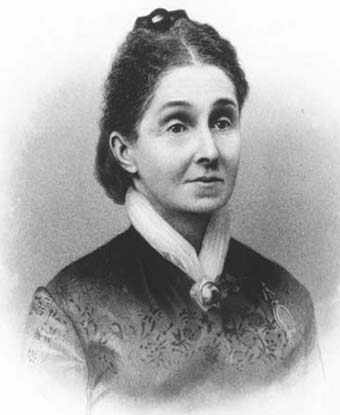Last updated: July 19, 2019
Person
Virginia Minor

From the collections of the Library of Congress
Virginia Louisa Minor was born March 27, 1824 in Goochland County, Virginia. She was related to the Meriwether and the Lewis families. She studied for a short time at an academy for young ladies in Charlottesville, Virginia, and was schooled at home. She was known for her charm and beauty, and was described as being "sweet and retiring-looking," with "ladylike manners" and an "old-fashioned" charm.
On August 31, 1843, she married her distant cousin, Francis Minor, a lawyer and graduate of Princeton and the University of Virginia. They lived in Mississippi for a time, close to family members who had emigrated there, and then moved to St. Louis in 1844 where an even larger family group had settled. Just prior to the Civil War they bought a farm in St. Louis, in what is now the Central West End. During the Civil War Louisa helped at hospitals in the St. Louis area through the Western Sanitary Commission. She also provided produce from their farm to soldiers at Benton Barracks, a Union Army encampment three miles north of their home.
The Minor’s only child, a son born in 1852, died in an accident in 1866. That same year Virginia Minor launched the woman suffrage movement in Missouri, and in 1867 took an active role in founding the Woman Suffrage Association of Missouri. She was elected the first president of this organization at their first meeting, held on May 8, 1867 in the Director's Room of the Mercantile Library in St. Louis.
On October 15, 1872, as part of a nation-wide plan organized by the National American Woman’s Suffrage Association, Virginia Minor tried to register to vote in the upcoming election. She was refused by St. Louis' sixth district registrar because she was a woman. While other women, like Susan B. Anthony, were jailed for their civil disobedience of voting, Virginia and her husband sued the registrar. They argued that women were U.S. citizens under the 14th amendment to the Constitution, which "nowhere gives [states] the power to prevent" a citizen from voting. The case eventually was heard by the US Supreme Court. The judges ruled that citizenship did not guarantee the right to vote. The decision was a blow to woman suffrage, and suffragists changed their tactics to get women access to the ballot.
Virginia Minor died on August 14, 1894, and was buried in Bellefontaine Cemetery in St. Louis. Since she regarded the clergy as hostile to equal rights for women, her funeral was conducted without a clergyman. Virginia Minor left $1,000 in her will to Susan B. Anthony for "the thousands she has expended for women," and $500 to each of two nieces, provided they did not marry; if one married, her share would go to the unmarried niece.
